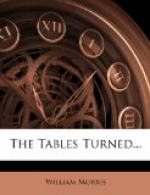M. P. Much good that would be! Would you listen to me if I did? I didn’t steal the loaves; but I wanted them, I can tell you that. But it’s all one; you are going to have it so, and I might as well have stolen a diamond necklace for all the justice I shall get here. What’s the odds? It’s of a piece with the rest of my life for the last three years. My husband was a handsome young countryman once, God help us! He could live on ten shillings a-week before he married me; let alone that he could pick up things here and there. Rabbits and hares some of them, as why should he not? And I could earn a little too; it was not so bad there. And then and for long the place was a pretty place, the little grey cottage among the trees, if the cupboard hadn’t been so bare; one can’t live on flowers and nightingale’s songs. Then the children came brisk, and the wages came slack; and the farmer got the new reaping-machine, and my binding came to an end; and topping turnips for a few days in the foggy November mornings don’t bring you in much, even when you havn’t just had a baby. And the skim milk was long ago gone, and the leasing, and the sack of tail-wheat, and the cheap cheeses almost for nothing, and the hedge-clippings, and it was just the bare ten shillings a-week. So at last, when we had heard enough of eighteen shillings a-week up in London, and we scarce knew what London meant, though we knew well enough what ten shillings a-week in the country meant, we said we’d go to London and try it there; and it had been a good harvest, quickly saved, which made it bad for us poor folk, as there was the less for us to do; and winter was creeping in on us. So up to London we came; for says Robert: “They’ll let us starve here, for aught I can see: they’ll do naught for us; let us do something for ourselves.” So up we came; and when all’s said, we had better have lain down and died in the grey cottage clean and empty. I dream of it yet at whiles: clean, but no longer empty; the crockery on the dresser, the flitch hanging from the rafters, the pot on the fire, the smell of new bread about; and the children fat and ruddy tumbling about in the sun; and my lad coming in at the door stooping his head a little; for our door is low, and he was a tall handsome chap in those days.—But what’s the use of talking? I’ve said enough: I didn’t steal the loaves—and if I had a done, where was the harm?
J. N. Enough, woman? Yes, and far more than enough. You are an undefended prisoner. You have not the advantage of counsel, or I would not have allowed you to go on so long. You would have done yourself more good by trying to refute the very serious accusation brought against you, than by rambling into a long statement of your wrongs against society. We all have our troubles to bear, and you must bear your share of them without offending against the laws of your country—the equal laws that are made for rich and poor alike.




